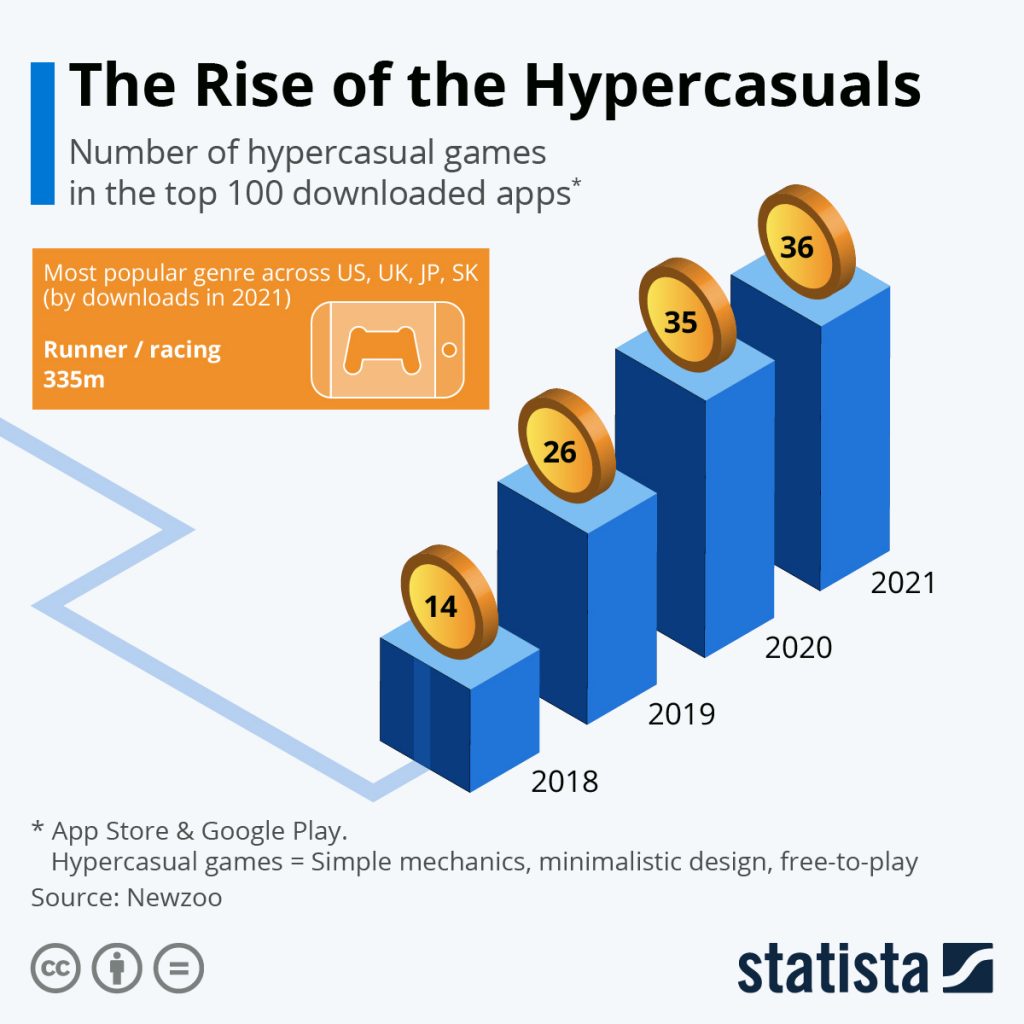It’s a fact that most game developers are looking at investing in hyper-casual game mechanics to increase revenue. In the past years, hyper-casual game mechanics have been the go-to of many casual and passive gamers.
Most hardcore gamers still dedicate their time to consoles and PCs. But mobile gaming is now getting a lot of dedicated players. In 2021, it became one of the most prominent video game segments. It’s also made a massive wave in barriers to entry. This year, it’s projected to cover 51% of the projected $203 billion revenue from mobile phones.
Reports show that hyper-casual game mechanics attract a huge chunk of players. It has been going on since 2018 and continues to do so. The number of downloads per year is staggering. In the UK, US, Japan, and South Korea, hyper-casual games are the most downloaded mobile game genre of 2021. This is despite the application of new IDFA regulations. From 2018 to 2021, the hyper-casual games available in the top 100 download charts increased by 14% to 36%.
Games using hyper-casual mechanics are the only genres that reported an increase in the number of downloads. It has a total revenue of 3.4 billion in ad monetization.
Consumer interest is ever-changing. It begs the question: how do you make sure that your hyper-casual game will continue to attract your target market?
Here’s what strengthens hyper-casual game mechanics at the top of the gaming pyramid.
Factors Making Hyper-Casual Game Mechanics Great for Revenue
Here are some things that make hyper-casual games appeal to more mobile gamers:
Ease of app development
The main advantage of hyper-casual games for developers is their ease of development. Developers only need to choose the best hyper-casual game mechanics. Most will try to experiment with one or two game mechanics and see if they will work for their target audience.
Often, game developers use a software framework. This strategy helps them piece together game physics, audio, elements, and logic into the game. Choosing the perfect engine helps in making the process easier and the game more enjoyable for gamers.
Remember, games must be minimalistic and straightforward enough for players to enjoy. It should reflect on the user interface and must be playable by almost anyone regardless of age or skill.
Effective user hook
While hyper-casual game mechanics are simple, they are highly addictive. Thus, it can hook more players than other game categories. Of the 1.7 billion worldwide mobile gamers in 2021, the numbers are highly likely to reach 2.2 billion within the next three years.
User acquisition should be the focus when creating a game and choosing the suitable hyper-casual game mechanics. It’s the most crucial part of success. So, the hook should gear towards its key markets, primarily the younger gaming population.
Infinite replay and challenges are critical. Developers must factor in why players keep coming back. They want to pass the time, relieve stress, and experience exhilaration by accomplishing a level. It provides an avenue for both developers and gamers.
High return on investment
Since hyper-casual games have a quick development process that can only take months, they have a high investment return. For developers, it requires less time and effort to create hyper-casual game mechanics that pique players’ interests.
What makes hyper-casual game mechanics stand out is that they can keep the gamers addicted with infinite replay. Players get the hang of the game. The challenges increase with each passing level. Ultimately, it provides the right balance of rawness and interest for players.
Once hooked, monetization is possible through in-app ads. Aligning these ads to the gameplay ensures gamers won’t have any distractions when playing the games. This makes it more effective and engaging.
Final Thoughts
Creating and developing a hit hyper-casual game mechanics is easy and attracts a huge user base. But, it’s a highly competitive segment. Developers and publishers of this genre must work with ad exchange networks to make their games stand out.Learn how to implement relevant advertising and marketing for your hyper-casual game needs. Connect with us















